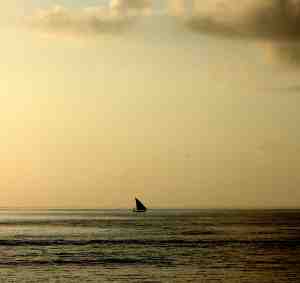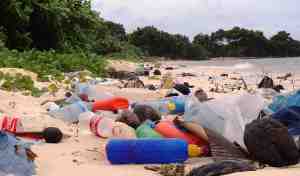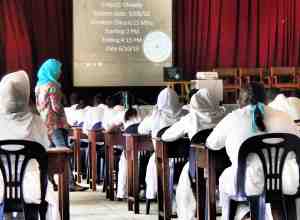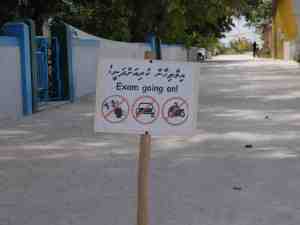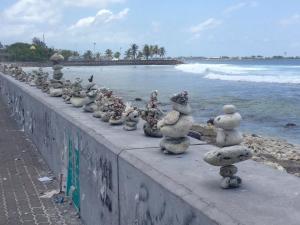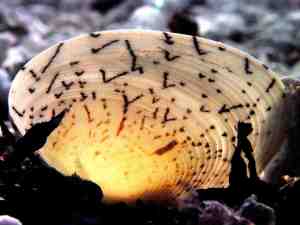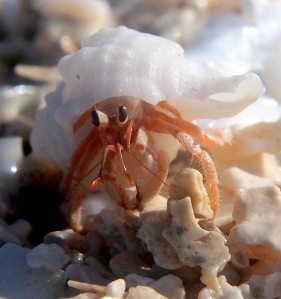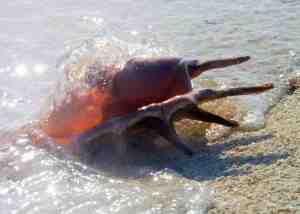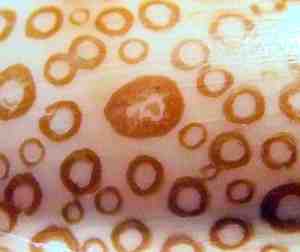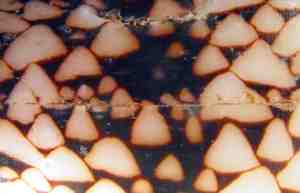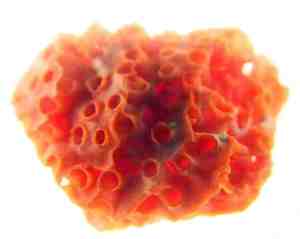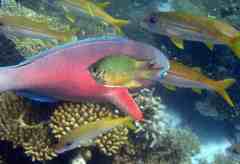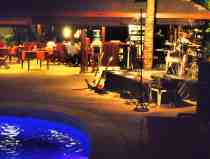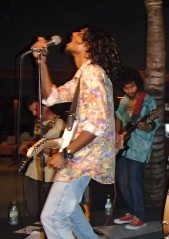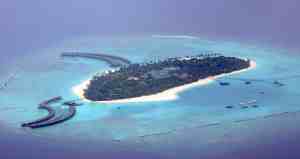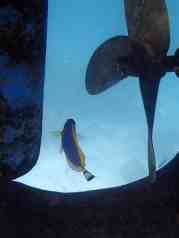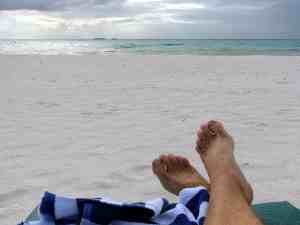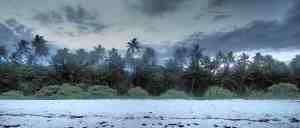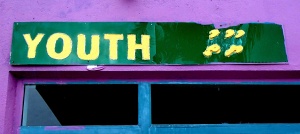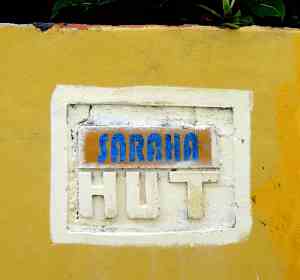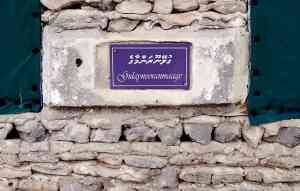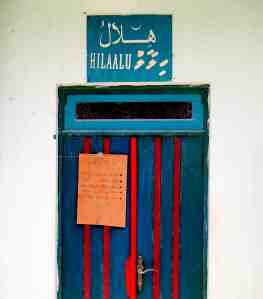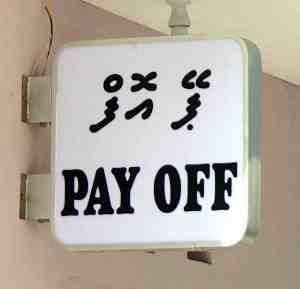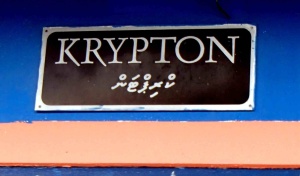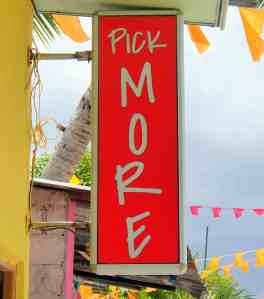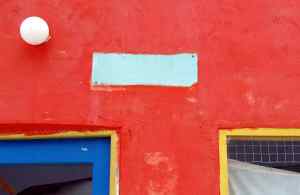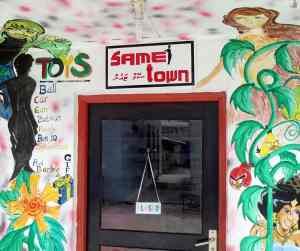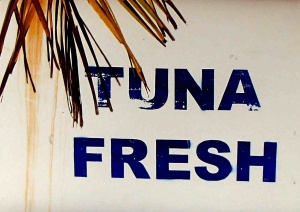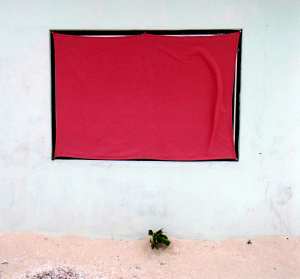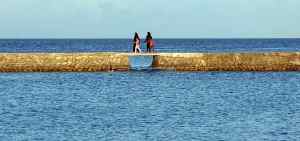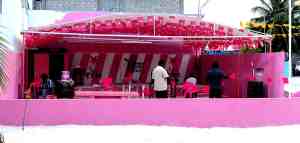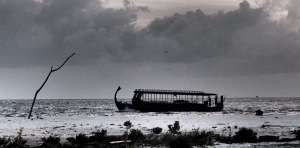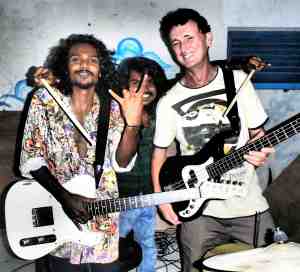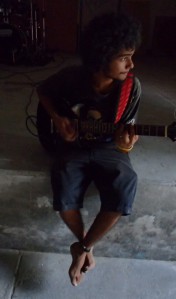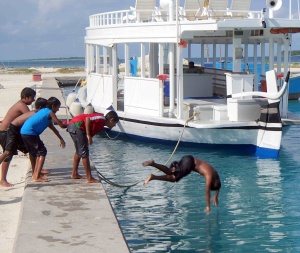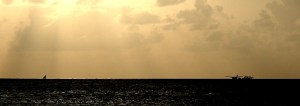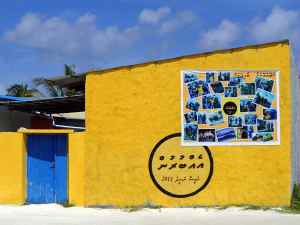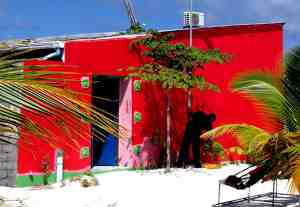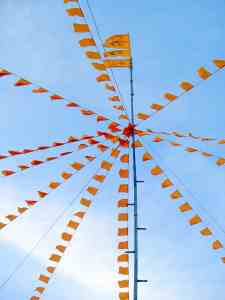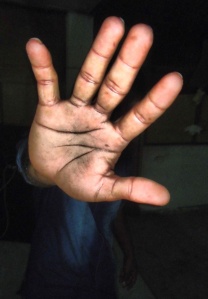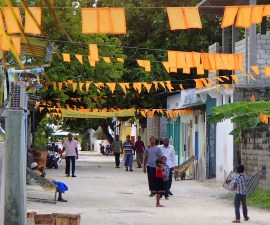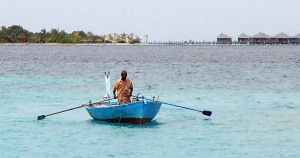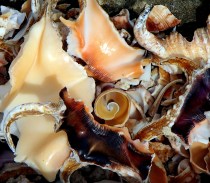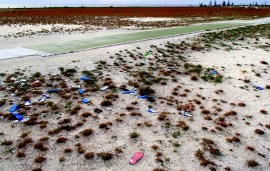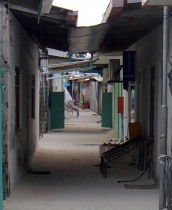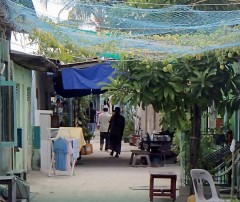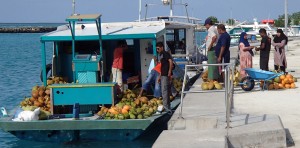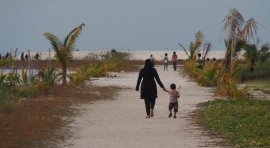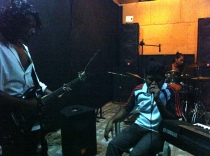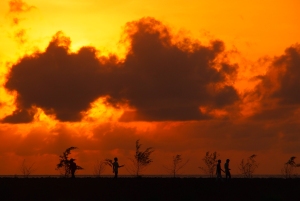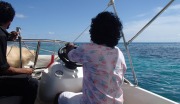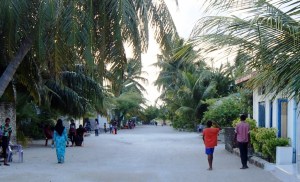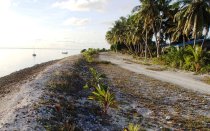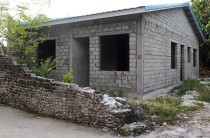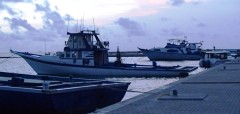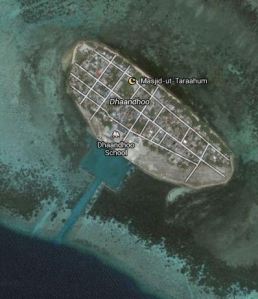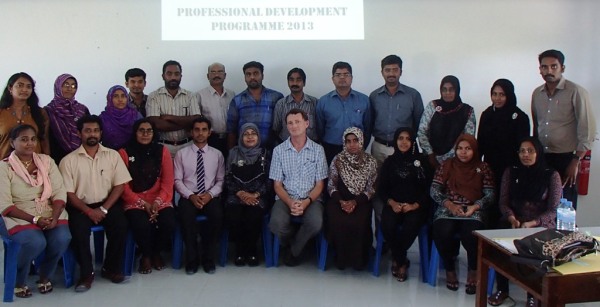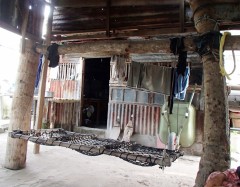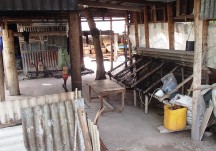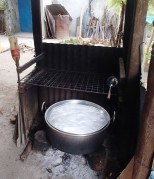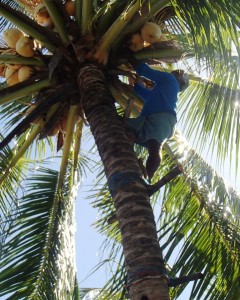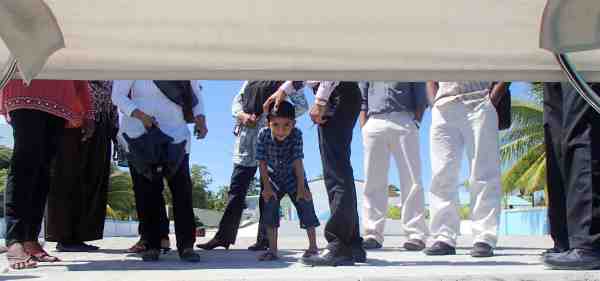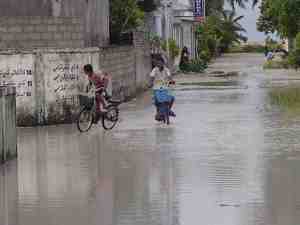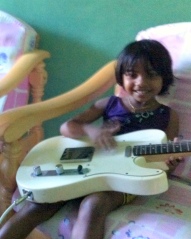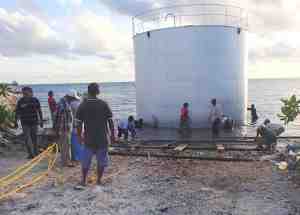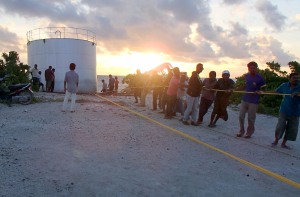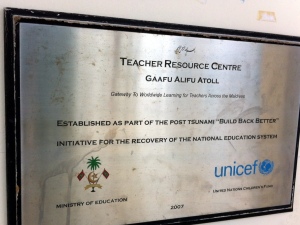Today is my last day in the Maldives. I don’t have time to write a tidy concluding piece to this blog but here is a collection of leftover bits & pieces from my notebooks that haven’t fitted into previous posts. Please note that the most recent post is at the top. To start the story from the beginning, scroll to the bottom.
The kindness of strangers
…is the title of a collection of travellers stories published by Lonely Planet. Here’s a few of mine:
- The man in Male’ who, when I asked directions to the ATM, said “Get on my motorcycle” and took me right to it.
- The security guard at Kooddoo airport, where the check-in hall was swelteringly hot and packed with a raucous mob of Chinese honeymooners heading for a resort. He discreetly led me to another room where I could wait for the delayed plane in quiet, air-conditioned solitude.
- When I asked for directions to the bank, the man who replied, “I’m going there too – walk with me.” It was payday and the bank was packed with Indian and Bangladeshi workers sending money home to their families. I lost sight of my guide, but while I was lining up to take a ticket for service he found me again – he’d already got me a ticket, and a place to wait under the air-conditioner.
- All the people I bought things from who didn’t use my ignorance as an opportunity to rip me off, including the man who ran after me with change when I thought he’d said the bag of mangoes was 50/- (a fair price) but he’d actually said 15/-.
- Rasheed from Dhandhoo who, upon seeing a stranger walk past his house, immediately came out, introduced himself, and took me on a guided walk around his island.
- Hosean from Hinnavaru, who saw me swimming, waded out to introduce himself and welcome me to his island and then waited on the beach until I’d finished so he could invite me to his home. He wanted to give me breakfast too, even though it was Ramazan and he wasn’t eating till sunset.
Tomatoes
Me: “Do you have any tomatoes?”
Bangladeshi shopkeeper: “No.”
It seems like a simple exchange, but if you had heard the infinite sadness in that one word, and seen look of grief on the poor man’s face, you would have realised that the meaning he was conveying was more complex: “As you well know, we have always been able to source tomatoes of the very best quality and freshness, shipped directly from my uncle’s farm in Noakhali. However my family recently suffered a great loss. While tending his tomato plants at dawn, my uncle was attacked and eaten by a tiger, and we have been unable to locate another supplier who can meet our high standards.” Or something like that.
I didn’t have the heart to ask if he had any tinned tomatoes.
Sailing
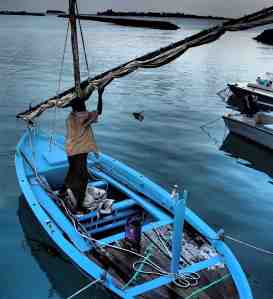 Most of the traditional dhonis had their masts and sails replaced with engines and propellers many years ago but on Hinnavaru there’s a few little ones that still have a sailing rig. In the evenings I would sometimes see an old man, crippled with arthritis, slowly and painfully baling out his boat, tidying the rigging and wrapping up the sail. Sometimes an even older man, clearly with dementia, would be trundled down to the boat-harbour in his wheelchair and they’d greet each other.
Most of the traditional dhonis had their masts and sails replaced with engines and propellers many years ago but on Hinnavaru there’s a few little ones that still have a sailing rig. In the evenings I would sometimes see an old man, crippled with arthritis, slowly and painfully baling out his boat, tidying the rigging and wrapping up the sail. Sometimes an even older man, clearly with dementia, would be trundled down to the boat-harbour in his wheelchair and they’d greet each other.
I had never actually seen one of these dhonis out sailing until one morning I woke very early and went for a walk around the island. There was the old man’s little boat dancing lightly along the horizon as the sun rose. There was no hint of the sailor’s age or arthritis – it was as if he had wings. He could have been a teenager.
In the distance was a storm cloud. It made me realise how vulnerable this old man was – there’s no lifejackets or safety gear in any of these boats. A sudden gust of wind or an unseen reef could be the end of him and no-one would notice until he was late for lunch. And then I thought – he would probably consider that a preferable outcome to ending up like his friend in the wheelchair.
Magazine
I read this in the Maldivian Airlines magazine while flying down to Villingili:
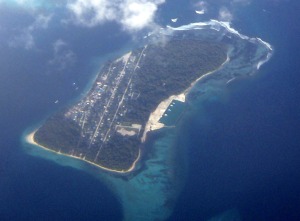 “Every island has, by decree of a former president, a straight road up and down and across the island. The orderliness and cleanliness is remarkable.”
“Every island has, by decree of a former president, a straight road up and down and across the island. The orderliness and cleanliness is remarkable.”
As you fly over the islands, you can see clearly how effectively that president’s order was carried out. My associate on Villingili told me that her family’s house was a lot bigger before the road was straightened and took out a few rooms.
The sandy beaches all look wonderfully enticing as you fly over, but once you land on an inhabited island you have cause to reflect on the magazine writer’s second sentence and wonder if they have ever been to this country. Most islands have no waste-management system apart from the daily tides.
Skills
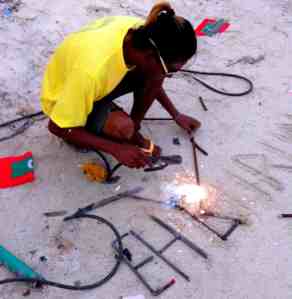 The school curriculum is academic and theoretical – it seems that someone has intentionally removed anything that could be seen as ‘fun’. Science subjects only do the theory papers, with no practical work in Physics, Chemistry or Biology; art is only taught in primary grades and I haven’t found any music in schools. There’s no Manual Arts or Home Economics equivalents – the concept of a Technology curriculum is totally unknown – and I’ve seen no opportunities for vocational education in the islands.
The school curriculum is academic and theoretical – it seems that someone has intentionally removed anything that could be seen as ‘fun’. Science subjects only do the theory papers, with no practical work in Physics, Chemistry or Biology; art is only taught in primary grades and I haven’t found any music in schools. There’s no Manual Arts or Home Economics equivalents – the concept of a Technology curriculum is totally unknown – and I’ve seen no opportunities for vocational education in the islands.
However, everyone seems to have survival skills, especially in electrical, plumbing, concreting, welding and engine repairs. They do a lot of welding. Some safety-conscious welders will wear a pair of knock-off Ray Bans but most don’t bother with any eye protection. This guy is making a sign for his political party’s meeting place. He’s obviously in the yellow party, and he’s using another party’s flags as his cleaning rags.
Games
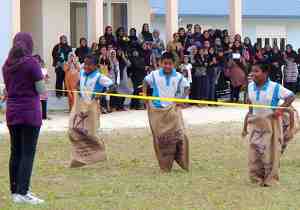 The people on Hinnavaru love organised games. Every afternoon during last week’s Eid holidays, the streets were filled with fun and laughter. Kids and grandmas were running around with flour bombs and water pistols filled with dye. Groups of a dozen or more people of all ages were having three-legged races, sack races, tug of war, and a whole lot of games I’d never seen before.
The people on Hinnavaru love organised games. Every afternoon during last week’s Eid holidays, the streets were filled with fun and laughter. Kids and grandmas were running around with flour bombs and water pistols filled with dye. Groups of a dozen or more people of all ages were having three-legged races, sack races, tug of war, and a whole lot of games I’d never seen before.
Bashi is usually played by women, and there’s a nationwide competition. A player from the ‘serving’ team stands on one side of a tennis net and repeatedly hits tennis balls backwards over her head as quickly and violently as possible, while the ‘receiving’ team tries to catch them and avoid getting too badly hurt. The server gets a point for each ball that isn’t caught, and is out if caught.
Tug of war is exciting. You can win in the usual way, but there’s a local twist – if your team looks like losing, you can try an alternate strategy of running rings around the other team with your end of the rope and tying them into a bundle.
There’s another game similar to one we called ‘Dog and Bone’ where two teams line up facing each other, there’s a sack on the ground in between them and when a number is called, the person with that number on each team tries to retrieve the sack. The local variation is that if both players get hold of the sack at the same time, the rest of the team can then form a sort of ‘reverse scrum’ where they grab their player around the waist and haul them back over the line – unless the player with the sack lets go or has their arms dislocated.
Seaplanes
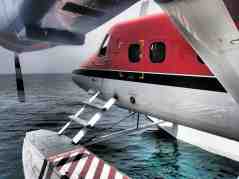 When I was a kid I built a model of a 1930s Supermarine seaplane – I’ve always thought they were wonderful machines but had never seen one up close until I came to Maldives. Down in Gaafu Alifu there was a land airport (one of only a handful in the country) but when I moved to Hinnavaru I found that all the resort visitors travel by seaplane and I saw them coming and going every day from a nearby island. I considered them a risky proposition, with a necessarily high centre of gravity, and at first would watch every take-off and landing with the expectation of the plane catching a wave at the wrong angle and flipping over.
When I was a kid I built a model of a 1930s Supermarine seaplane – I’ve always thought they were wonderful machines but had never seen one up close until I came to Maldives. Down in Gaafu Alifu there was a land airport (one of only a handful in the country) but when I moved to Hinnavaru I found that all the resort visitors travel by seaplane and I saw them coming and going every day from a nearby island. I considered them a risky proposition, with a necessarily high centre of gravity, and at first would watch every take-off and landing with the expectation of the plane catching a wave at the wrong angle and flipping over.
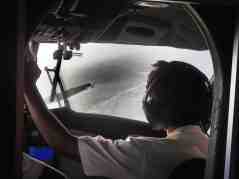 By the time I got to fly in one, I’d seen enough successful flights to give me more confidence. Once in the air I realised that when 99% of a nation’s area is ocean, an emergency landing is much less likely to go bad if you’re in a plane with floats instead of wheels.
By the time I got to fly in one, I’d seen enough successful flights to give me more confidence. Once in the air I realised that when 99% of a nation’s area is ocean, an emergency landing is much less likely to go bad if you’re in a plane with floats instead of wheels.
Flying in them is great fun. There’s no airport formalities with take-off – just drop the mooring rope, point the plane into the wind and you’re in the air before you’ve gone 100 metres. They stay low so you get wonderful views of the islands, and there’s a 66% chance of getting a window seat. There’s no cockpit door so you can watch the barefooted pilots and see through their windscreen as they dive to land beside a beach or jetty.

